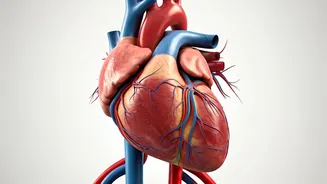Embrace Regular Exercise
Regular physical activity is one of the most effective strategies for boosting blood circulation. Exercise helps to strengthen the heart, which pumps blood more
efficiently throughout the body. Furthermore, it encourages the formation of new blood vessels, a process called angiogenesis, improving blood flow to muscles and organs. Engaging in activities like brisk walking, jogging, cycling, or swimming for at least 30 minutes most days of the week can make a significant difference. Regular exercise not only enhances circulation but also lowers blood pressure, reduces the risk of heart disease, and helps to maintain a healthy weight. Consistency is crucial; incorporating exercise into your daily routine is a long-term investment in your vascular health.
Stay Hydrated Daily
Hydration plays a crucial role in maintaining healthy blood circulation. Blood is primarily composed of water, and adequate hydration keeps the blood from becoming too thick, which can impede its flow. Dehydration leads to increased blood viscosity, making it harder for the heart to pump blood effectively. Aim to drink sufficient water throughout the day, particularly before, during, and after exercise. The exact amount of water needed varies from person to person, but a good starting point is eight glasses of water per day. Pay attention to your body's signals; thirst is a clear indication that you need to replenish fluids. Staying hydrated also helps to maintain healthy blood pressure and supports the overall function of your cardiovascular system.
Optimize Your Diet
Your diet directly impacts your vascular health, and making informed choices can greatly improve circulation. Focus on consuming a diet rich in fruits, vegetables, whole grains, and lean proteins. These foods are packed with nutrients that support healthy blood vessels and promote efficient blood flow. For example, foods rich in omega-3 fatty acids, such as salmon, flaxseeds, and walnuts, can reduce inflammation and improve blood vessel function. Limit your intake of saturated and trans fats, which can contribute to the buildup of plaque in arteries, hindering blood flow. Additionally, reducing your consumption of processed foods, sugary drinks, and excessive salt can help maintain healthy blood pressure and support optimal circulation. A balanced diet is a cornerstone of good cardiovascular health.
Manage Stress Effectively
Chronic stress can negatively affect your cardiovascular health by constricting blood vessels, leading to reduced blood flow. Finding effective ways to manage stress is therefore essential for improving circulation. Techniques such as meditation, deep breathing exercises, and yoga can help calm the nervous system and promote relaxation, which in turn benefits blood flow. Engage in activities you find enjoyable, like spending time in nature, pursuing hobbies, or socializing with friends and family, to relieve stress. Consider incorporating mindfulness practices into your daily routine to become more aware of stress triggers and develop coping mechanisms. By reducing stress levels, you can help your blood vessels remain relaxed and open, facilitating optimal blood circulation.
Avoid Prolonged Sitting
Prolonged periods of sitting can significantly impede blood circulation, particularly in the legs and feet. When you sit for extended durations, blood tends to pool in the lower extremities, increasing the risk of blood clots and reducing blood flow. To counteract this, take regular breaks to move around. Set a timer to get up and walk around every 30 minutes. Perform simple exercises like ankle rotations, calf stretches, and leg lifts while seated to promote circulation. For those with desk jobs, consider using a standing desk or incorporating ergonomic practices to promote better posture and blood flow. Even small adjustments, such as taking a short walk during your lunch break, can make a positive difference in your vascular health and overall well-being.











